Coronavirus: Tea trolley keeping pharmacy staff and customers safe
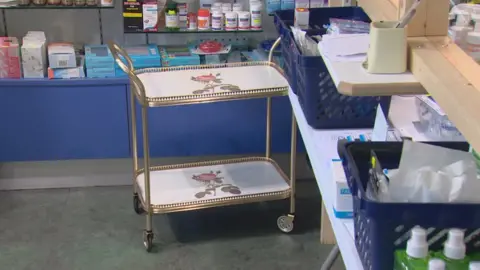 BBC
BBCA tea tray on wheels might not be the first thing which comes to mind when it comes to social distancing, but it is one of the measures being used in a Glasgow pharmacy.
From the high-tech to the much more homespun solutions, people across Scotland are considering how they will get used to the new ways we will have to interact with each other when we begin to get out and about.
"We just roll it forward, it's absolutely great," says Glasgow pharmacist Elizabeth Roddick.
"It brings a smile to everybody's face and we enjoy it too because it's keeping them safe and us safe too."
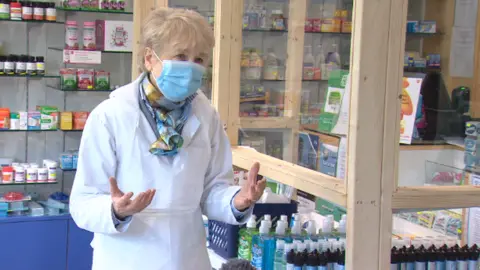
Mrs Roddick is using the tray - which was an old wedding present - as a creative way to pass over prescriptions or the contactless payment machine.
It is pushed towards the customer and pulled back with a rope.
It is part of a range of measures, including distance markers on the floor and a wooden frame with a screen which keeps people back from the counter.
"Everybody was coming right up to the counter," she explains.
"People are behind the screen, we're behind the counter and nobody gets too close."
'Fun point'
Elsewhere in Europe, people have already been doing some creative thinking about how to socially distance beyond simple markings on the ground.
One restaurant in Amsterdam, for instance, has hired an artist to place mannequins around the space to keep customers apart but without ruining the atmosphere.
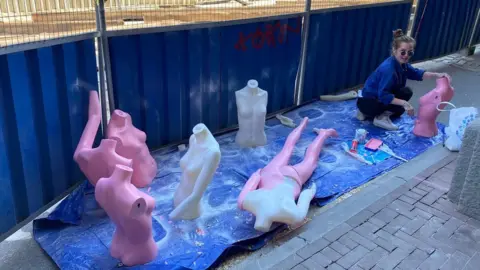 Lauren Comiteau
Lauren Comiteau"It gives a kind of feeling of ambience and that the place is a bit more full," says artist Nora Kalabokas. She says she thinks there will be roughly the same number of mannequins and real people.
"There will be arrows and lanes in most places where people can move and where they cannot," she adds.
"And of course it's practical because people have to get used to this distancing, but on the other hand it's a bit restricting."
One cafe in Germany handed hats made of swimming floats to customers on their first day back in businesses. The idea was to make a fun point about social distancing.
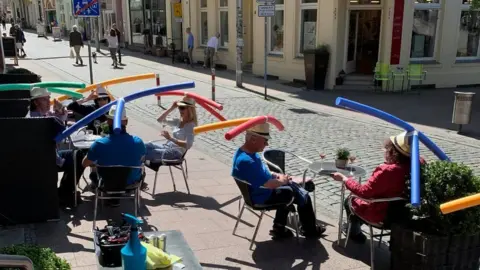 Café Rothe Schwerin; Owner Jacqueline Rothe
Café Rothe Schwerin; Owner Jacqueline RotheAt the other end of the technology spectrum, people are also looking at higher-tech solutions as to how we might organise ourselves.
"It's not just visual impairments, somebody with autism or dementia standing in a queue can feel the most amazing amount of anxiety," explains Gavin Neate of Neatbox.
His app, which alerts businesses that someone who has a disability and might need help is on their way, was already up and running but he thinks it can help as we get used to the need for social distancing.
"Increasingly there's an opportunity to actually provide a service where somebody will know who's just about to walk round the corner, before they walk round the corner and do the most important thing which is help the staff member help the disabled visitor."
Providing shelter
In communities across Scotland, there will be very individual things which people need to do to adapt - but also things they will have in common.
Experts say there is room for both high and low-tech solutions and also ones which can work with the Scottish weather.
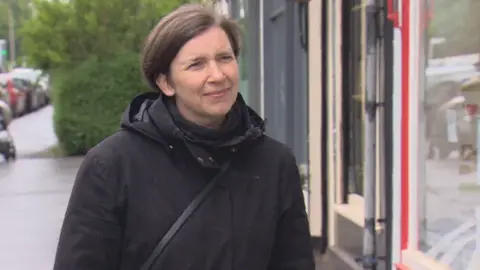
"It's more about providing shelter and refuge and a place for people to nestle into corners and such like," says Jude Barbour, architect and director at Collective Architecture.
She says solutions need not be expensive but might involve thinking about how we use our spaces.
"There are also a lot of empty buildings that could be repurposed," she explains.
"Significant areas of land that could be repurposed, could be reimagined and could be reused."

- THE R NUMBER: What it means and why it matters
- LOOK-UP TOOL: How many cases in your area?
- GLOBAL SPREAD: Tracking the pandemic
- RECOVERY: How long does it take to get better?

